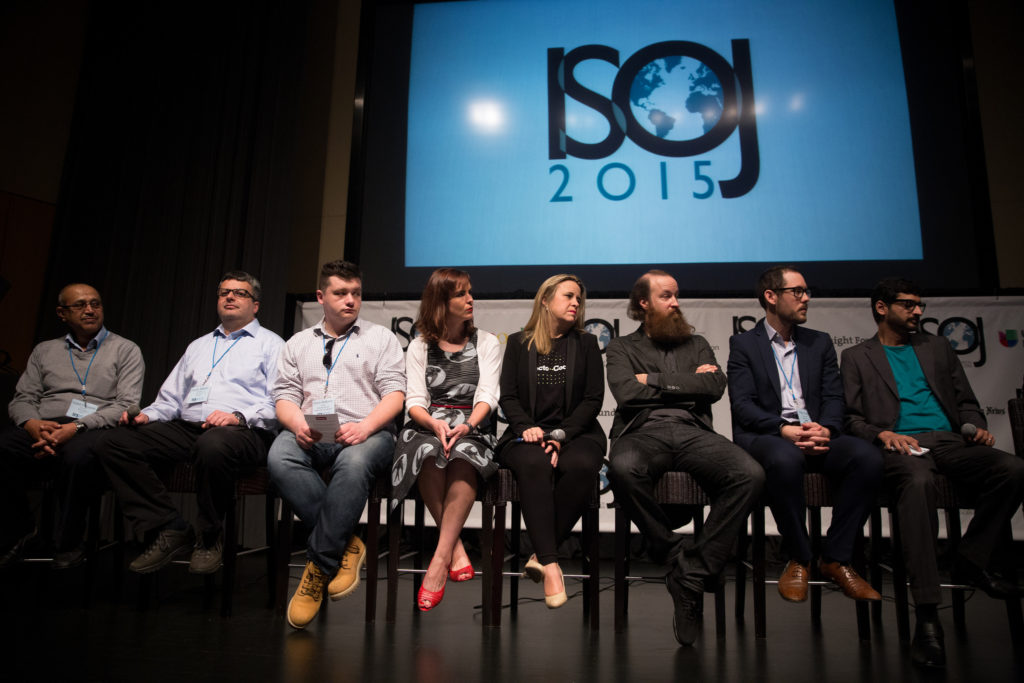April 18, 2015 | Featured, International
International online journalists continue to inform citizens despite threats of censorship and violence, ISOJ gathering told
Brave, hard-headed, persistent, and possessed with a good sense of humor.
These are the characteristics shared by eight international journalists who talked about the challenges they face trying to inform the public, said Maria Teresa Ronderos, director of the Independent Journalism program at Open Society Foundations.

Ronderos chaired the panel “A global roundup: How journalists are using the Internet in their struggle for democracy, human rights and press freedom around the world” on Saturday, April 18, at the International Symposium on Online Journalism (ISOJ).
The panel included: Tamas Bodoky, director of Atlatszo (Hungary); Haris Dedovic, editor-in-chief of Karike (Bosnia and Herzegovina); Gopal Guragain, CEO of Ujyaalo Multimedia (Nepal); Jahanzaib Haque, editor of Dawn (Pakistan); Mike Runey, program manager of Meydan TV (Azerbaijan); Gregroy Shevdov, editor-in-chief of Caucasian Knot (Russia); Laura Weffer, editor of Efecto Cocuyo (Venezuela); and Anim van Wyk, deputy editor of Africa Check (South Africa).
Providing reliable, timely, and relevant information becomes the main function of a journalist living in a country with human rights violations and governments with little tolerance for freedom of expression.
For instance, Bodoky of Atlatszo — which means “transparent” — said the Hungarian government has increasingly turned toward authoritarianism with a strong inclination “to push aside critical voices.” It is for this reason that Atlatszo, which was born in 2011 as a platform for independent investigative journalism, has also taken on a kind of activism for freedom of information.
A similar scenario is playing out in Venezuela, said Weffer during her presentation. According to the journalist, the South American country is experiencing an information blackout that keeps people from receiving information about the country’s situation. In response, roughly translated Efecto Cocuyo means “firefly effect” and is related to the goal of “bringing light to darkness” in Venezuela.
The case of Meydan TV — which means “public square” — exemplifies the extreme lengths that journalists must take in order to publish in countries that actively restrict the flow of information. The media outlet, which reports on Azerbaijan, has relocated its headquarters to Berlin, Germany. Its goal is to publish information on topics that otherwise would not find a place in other media: investigations of corruption and nepotism, the rights of the LGBTI community as well as rights of people with disabilities.
“It is a totalitarian state,” Runey said of Azerbaijan. “It has put everybody in jail. It is not only journalists, it is also civil society organizations,” which is why its collaborators are in different countries.
Although these media organizations and Web sites have seen technology benefit their projects, they understand that it is a differentiating factor according to the region where they are working.
Shevdov, with Caucasian Knot, a media outlet that reports on human rights violations in Russia, reminded the ISOJ audience that there are parts of the world where mobile technology is not that prevalent, or where online access is not that ubiquitous.
He said his organization tells its audience to not rely exclusively on journalists, but to help them inform the public on what is happening in the region.
“We ask that you inform us through text messages,” said Shevdov. “We tell our audience inform us and we will amplify your voice.”
The journalist also understands that technology can just as easily be used by the state and other groups to restrict freedom of speech, a point his fellow journalists agreed with.
Haque said that the Internet as a free space in Pakistan is being threatened and that legislation is being introduced that would allow for the prosecution of anti-Islamic and anti-state content found online.
Additionally, because of the Islamic State’s actions in the Middle East, local militants have increased their online capabilities, commenting on Dawn’s stories using Twitter, he said.
“It’s a dangerous environment and this whole idea of surveillance from either side is really worrying,” said Haque.
Although they are in an extremely challenging situation, they understand that it is precisely in these moments when journalism is needed most.
“Any government wants to control the media. That is not new,” said Dedovic, editor-in-chief of Karike in Bosnia and Herzegovina. “Struggles are the same from different positions. However, it is a fight needed to be fought.”
The 16th annual ISOJ was held April 17-18 at the Blanton Museum of Art, on the campus of the University of Texas at Austin.
ISOJ 2015: Global Roundup Panel, from Knight Center on Vimeo.

